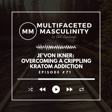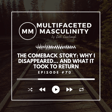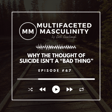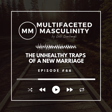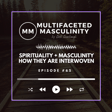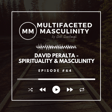
The Confusion of CoDependency | #44
Have you ever felt like there was a wet blanket over your mind or your heart, making it difficult to think or feel good? One reason this may be happening is because of Codependency. We experience codependency in many ways; maybe with where we live, our careers, the climate of our lives in general, but in this episode, Josh and Seth discuss Codependency within relationships. Since they can be the most difficult to navigate, overcoming Codependency in relationships could ultimately help us to overcome it in other areas of our lives as well.
In this episode you'll learn:
- How to identify Codependency in our relationships
- What to do when the confusion sets in and it’s hard to see straight
- What it looks like when we enable boundary violations
- How FEAR drives us to be codependent
- Tools and Strategies to remove confusion from codependency
“You’re using your need for Connection as a facade to justify violating her boundaries” - Josh
“I spent years in my marriage trying to conform to what she wanted me to be without knowing how to voice my needs in the relationship” - Seth
Links
Host Name: Josh Cearbaugh
https://www.instagram.com/jcearbaugh/
https://facebook.com/joshcearbaugh
https://www.jumpstartyourlife.com
LinksHost Name: Seth Conner
https://www.instagram.com/sethaconner/
https://www.facebook.com/iSethConner/
https://www.linkedin.com/in/sethaconner/
Companies, Products & Places Mentioned
Mushroom Doctor (psilocybin micro-dosing)
www.MushroomDoctor.co/shop
John Hopkins University (Depression/Smoking Cessation/Etc) (https://www.hopkinsmedicine.org/psychiatry/research/psychedelics-research.html)
Resources Mentioned
The Power of TED (The Empowerment Dynamic) (https://www.amazon.com/POWER-TED-EMPOWERMENT-DYNAMIC-Anniversary/dp/0996871802)
Default Mode Network (https://psychedelicstoday.com/2020/02/04/psychedelics-and-the-default-mode-network/)
